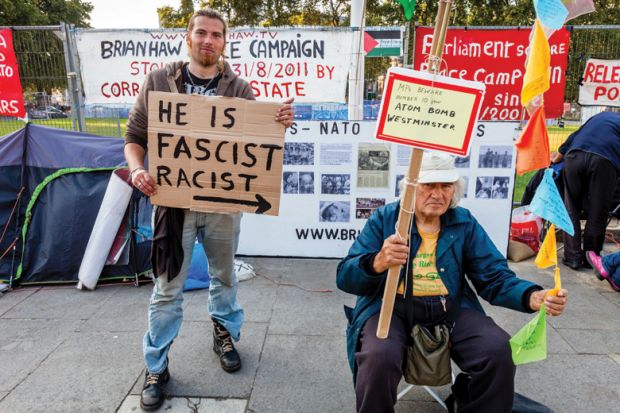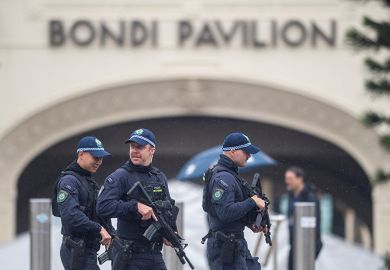A team of writers and campaigners have put the case for more offensive speech in the academy.
In his introduction to Unsafe Space: The Crisis of Free Speech on Campus, Tom Slater – deputy editor of online magazine spiked and coordinator of its Free Speech University Rankings – looks back to the 1960s Free Speech Movement at the University of California, when “students demanded to be taken seriously as autonomous beings, capable of negotiating their academic, political and social lives away from the tutelage of their tweeded minders”.
Today, by contrast, argues Mr Slater, universities “censor anything that might make students ‘feel uncomfortable’”, from feminists to fascists, when they should be “places for thinking the unthinkable and saying the unsayable”.
Contributors then spell out the threats to free speech posed by “trigger warnings”, the abortion debate, the Boycott, Divestment and Sanctions movement against Israel, and concerns about “lad culture”.
Peter Wood, president of the National Association of Scholars in the US, savages claims that a “liberal obsession” with “academic freedom” needs to be replaced with a concern for “academic justice”. In the case of what he calls the “Established Church of Climate Catastrophe” and their “ferocious attacks on climate sceptics”, he sees both “the new spirit of enforced conformity in the name of social justice” and “the new fanaticism centred on a belief in an eco-apocalypse”.
In a chapter of his own, Mr Slater criticises the UK government’s Prevent agenda, on the grounds that we need “Islamist ideas…to be debated and demolished”. Yet the universities and student bodies “decrying state censorship” can never make it a matter of principle because they have been “carrying out their own censorship on an industrial scale” – against, for example, “No Platformed inflammatory politicians, ‘transphobic’ feminists and un-PC comedians”.
Prime minister David Cameron has said that “you don’t have to support violence to subscribe to certain intolerant ideas which create a climate in which extremists can flourish”. Mr Slater detects “the same alarmist sentiment with different prejudices attached” in the view of many students’ unions that “hypersexualised, laddish expression constitutes a ‘rape culture’ that affirms ‘rape-supportive attitudes’ and can lead men to commit heinous acts”.
He ends the book with a call to arms: “The debate is never over…History is full of people getting things wrong. Let your opponents speak – maybe you’ll learn something.”
Unsafe Space: The Crisis of Free Speech on Campus, edited by Tom Slater, will be published shortly by Palgrave Macmillan and is already available as an e-book.
Register to continue
Why register?
- Registration is free and only takes a moment
- Once registered, you can read 3 articles a month
- Sign up for our newsletter
Subscribe
Or subscribe for unlimited access to:
- Unlimited access to news, views, insights & reviews
- Digital editions
- Digital access to THE’s university and college rankings analysis
Already registered or a current subscriber?




